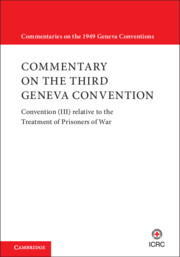 Commentary on the Third Geneva Convention
Commentary on the Third Geneva Convention Book contents
- Commentary on the Third Geneva Convention
- International Committee of the Red Cross
- Copyright page
- Contents
- Foreword by Peter Maurer
- Acknowledgements
- Abbreviations
- Introduction
- Preamble
- Part I General Provisions
- Part II General Protection of Prisoners of War
- Part III Captivity
- Part IV Termination of Captivity
- Part V Information Bureaux and Relief Societies for Prisoners of War
- Part VI Execution of the Convention
- Book part
- Sources
- Index
- References
Article 47 - Circumstances Precluding Transfer of Prisoners
from Chapter VIII - Transfer of Prisoners of War After their Arrival in Camp
Published online by Cambridge University Press: 21 August 2021
- Commentary on the Third Geneva Convention
- International Committee of the Red Cross
- Copyright page
- Contents
- Foreword by Peter Maurer
- Acknowledgements
- Abbreviations
- Introduction
- Preamble
- Part I General Provisions
- Part II General Protection of Prisoners of War
- Part III Captivity
- Part IV Termination of Captivity
- Part V Information Bureaux and Relief Societies for Prisoners of War
- Part VI Execution of the Convention
- Book part
- Sources
- Index
- References
Summary
As was the case generally with the provisions on transfer of prisonersof war after their arrival in camp (Chapter VIII), negative experiencesduring the Second World War inspired Article 47. The prohibitory natureof the present article is clear and is best illustrated by comparing itwith its predecessor in the 1929 Geneva Convention on Prisoners of War,which stated that, ‘[u]nless the course of military operations demandsit, sick and wounded prisoners of war shall not be transferred if theirrecovery might be prejudiced by the journey’. Where the 1929 textallowed for an imperative operational exception to this prohibition, thepresent article permits transfers detrimental to the condition ofwounded or sick prisoners of war or of prisoners exposed to nearbyhostilities only where the safety of theprisoners themselves requires it or where prisoners face greater dangerfrom combat by remaining in place than by being moved. The provision wasadopted unanimously.
- Type
- Chapter
- Information
- Commentary on the Third Geneva ConventionConvention (III) relative to the Treatment of Prisoners of War, pp. 968 - 970Publisher: Cambridge University PressPrint publication year: 2021
